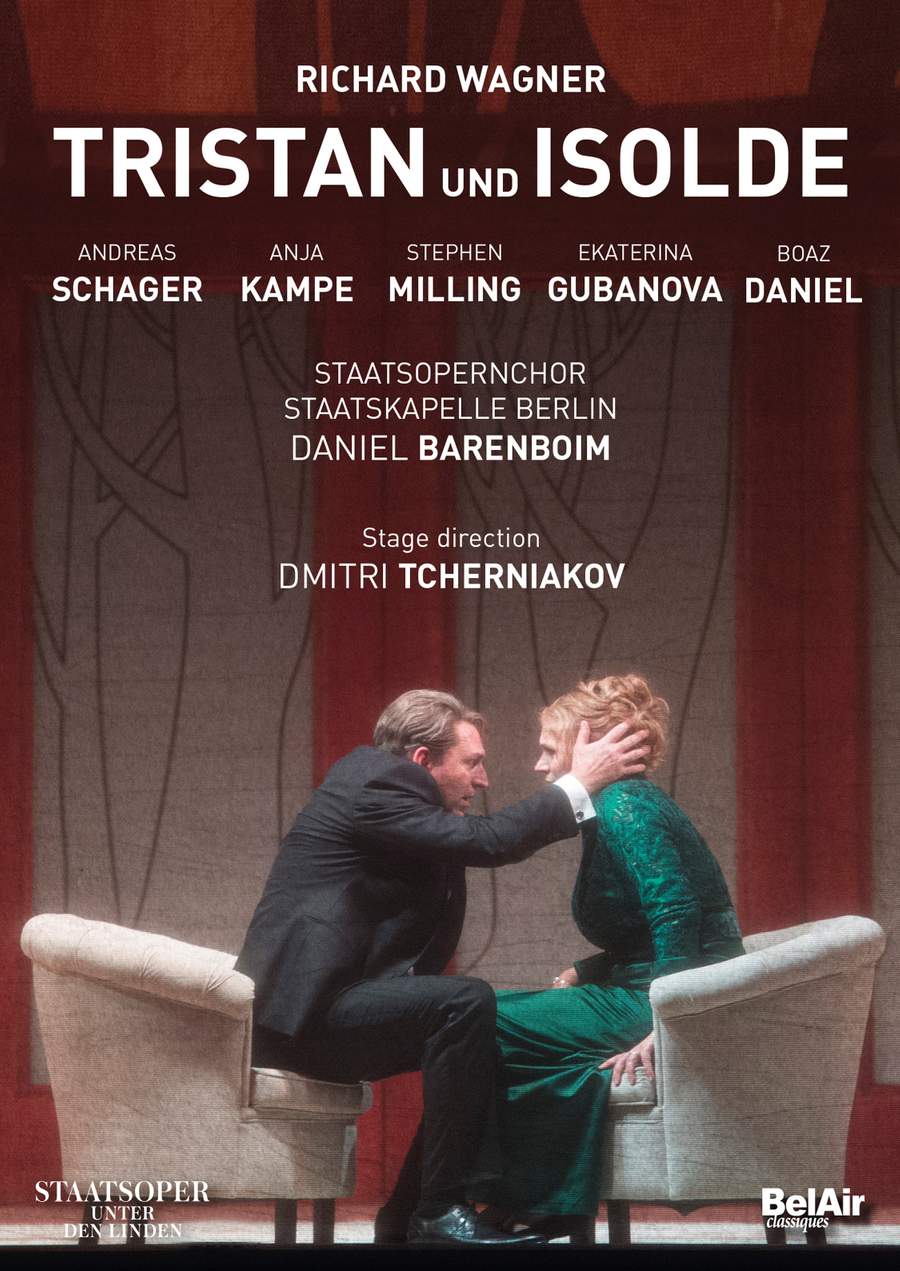WAGNER Tristan und Isolde (Barenboim)
View record and artist detailsRecord and Artist Details
Genre:
Opera
Label: Bel Air Classiques
Magazine Review Date: 08/2022
Media Format: Digital Versatile Disc
Media Runtime: 254
Mastering:
DDD
Catalogue Number: BAC165

Tracks:
| Composition | Artist Credit |
|---|---|
| Tristan und Isolde |
Richard Wagner, Composer
Adam Kutny, Steersman, Baritone Andreas Schager, Tristan, Tenor Anja Kampe, Isolde, Soprano Berlin Staatskapelle Boaz Daniel, Kurwenal, Baritone Daniel Barenboim, Conductor Ekaterina Gubanova, Brangäne, Mezzo soprano Linard Vrielink, Sailor; Shepherd, Tenor Stephan Rügamer, Melot, Tenor Stephen Milling, King Marke, Bass |
Author: Mike Ashman
Neither conductor Barenboim (with several decades’ performances) nor stage director Tcherniakov (two previous productions) are beginners with this piece, and it shows. If Tcherniakov sometimes appears to go a little crazy – there can’t have been many Tristans that end with Isolde setting an alarm clock and going to lie down in an alcove bedroom next to her lover’s corpse – there’s always a reason.
Here we’re not in the literal geography of Wagner’s stage directions. The Russian director/designer presents three interiors instead of Wagner’s three exteriors: the sea in the outer acts may be imagined through a window; the Act 2 trees are on the wallpaper. There’s no Act 1 ship as such but we might be looking at one of its luxury cabins. Costumes are modern-ish (more 1970s than now). A crowd of people (Act 1 court officials in business suits, Act 2 a hunting party with rifles) are on stage to threaten the privacy of the lovers instead of just empty space. In Act 3 we also get Tristan’s mother and father and the actual cor anglais player.
Yet within those parameters Tcherniakov’s staging is quite narrative-based. It features exceptional physical energy and movement, especially from Schager’s Tristan, and intense, detailed and personal (I want to say Chekhovian) acting from the trio of him, Kampe’s Isolde and Gubanova’s Brangäne. Unlike many Tristans – including three previous intriguing Barenboim collaborations with Jean-Pierre Ponnelle, Heiner Müller and Patrice Chéreau – the complex text of all three big Tristan and Isolde scenes is not just delivered but debated, pondered over and sometimes even clearly not understood by the characters hearing it. That’s exciting, rather new and pulls us the spectators more into following it too.
Act 3 also introduces some questioning of the narrative approach where there could be doubts. Does the ship with Isolde really come? Kurwenal is seen to be prompting the cor anglais to play a happy tune. Is Isolde dead herself or just on another level of being? See the ending described above. For Tcherniakov’s production this is rather like those maths exams that used to ask candidates clearly to show all their workings out.
This has always been a special score for Barenboim, who continues – in fact even more now – to conduct it with a Furtwängler-like fluency that sounds inevitable thanks to the great secret of never over-emphasising climaxes or motifs. He guides these singers with care, love and excitement – and it’s good to look forward to the planned completion of a new Ring next year at this venue with these two principal singers. The orchestra, I must add, is on especially tip-top form, with some superb work from brass and winds. Vocally speaking, we may not be in a world of Heldenstimmen but all respond with clarity and warmth so we don’t feel starved of sheer decibels.
Warmly recommended, then, but if you want something more Romantic and (dare one say it?) medieval for your home viewing, try one of the other Barenboim sets, especially the Ponnelle (DG, 11/07) and the Chéreau (Virgin). The Bayreuth Christoph Marthaler/Anna Viebrock conducted by Peter Schneider (Opus Arte, 5/10) remains a kind of reference dictionary to modern-day opera production style.
Discover the world's largest classical music catalogue with Presto Music.

Gramophone Digital Club
- Digital Edition
- Digital Archive
- Reviews Database
- Full website access
From £8.75 / month
Subscribe
Gramophone Full Club
- Print Edition
- Digital Edition
- Digital Archive
- Reviews Database
- Full website access
From £11.00 / month
Subscribe
If you are a library, university or other organisation that would be interested in an institutional subscription to Gramophone please click here for further information.




